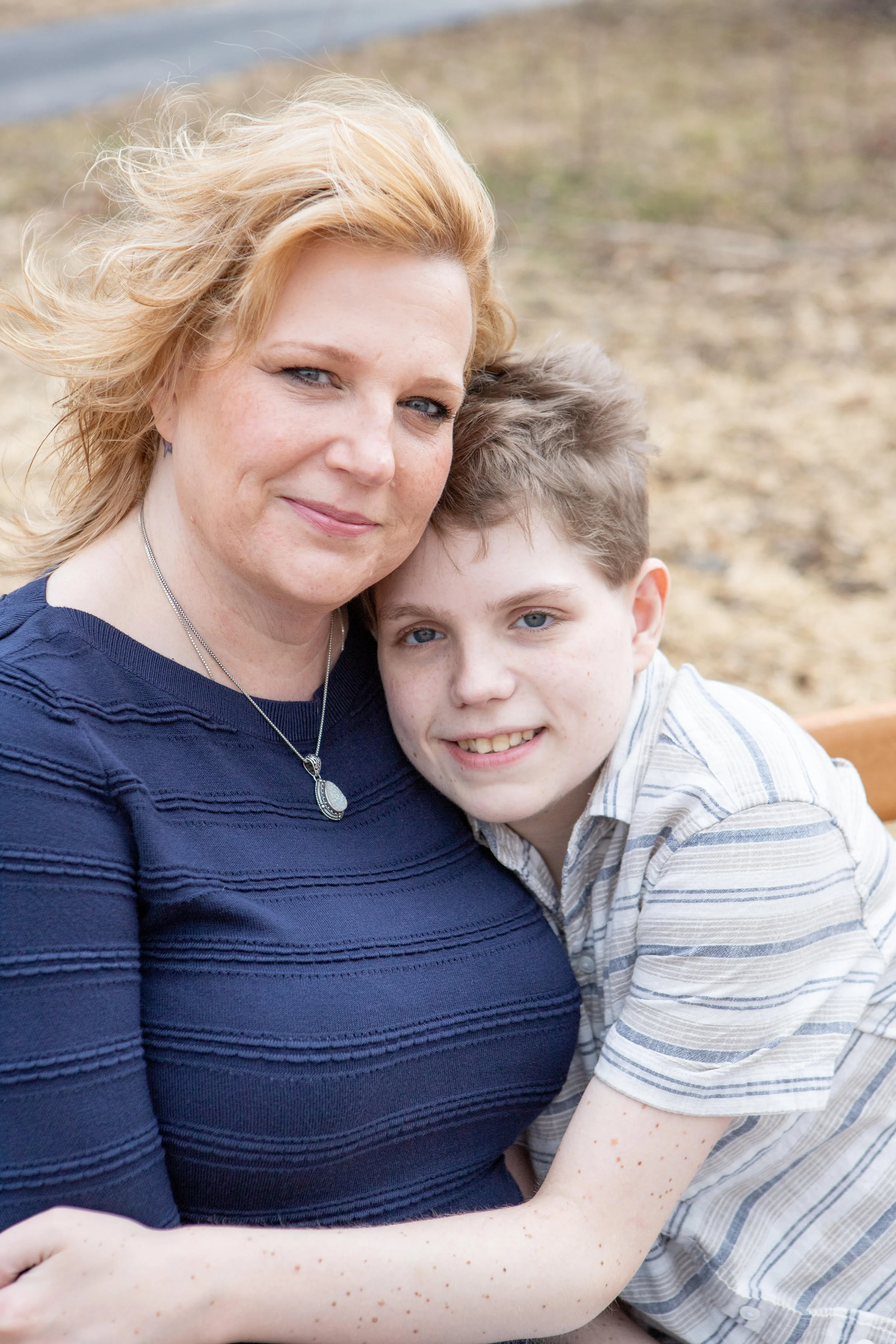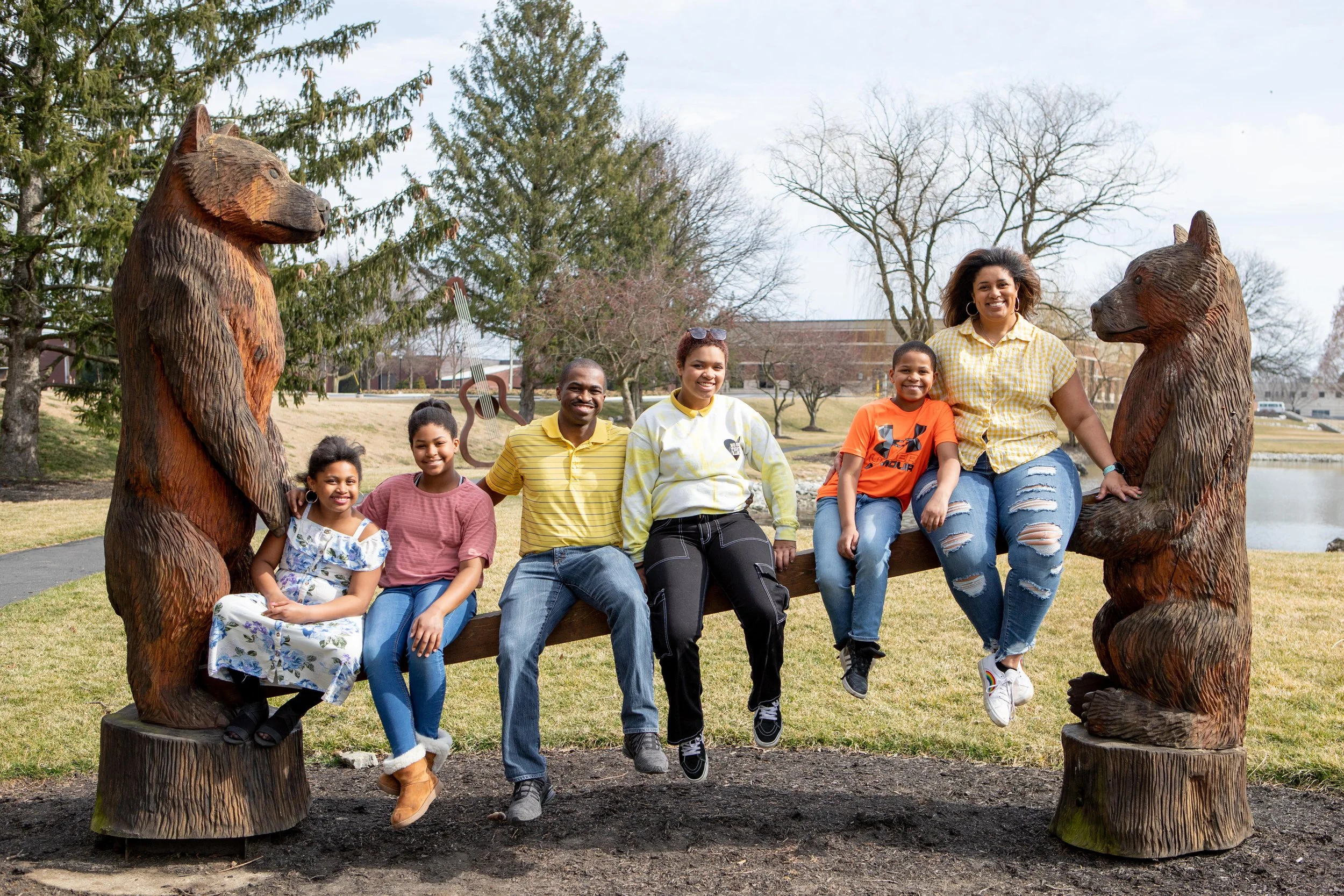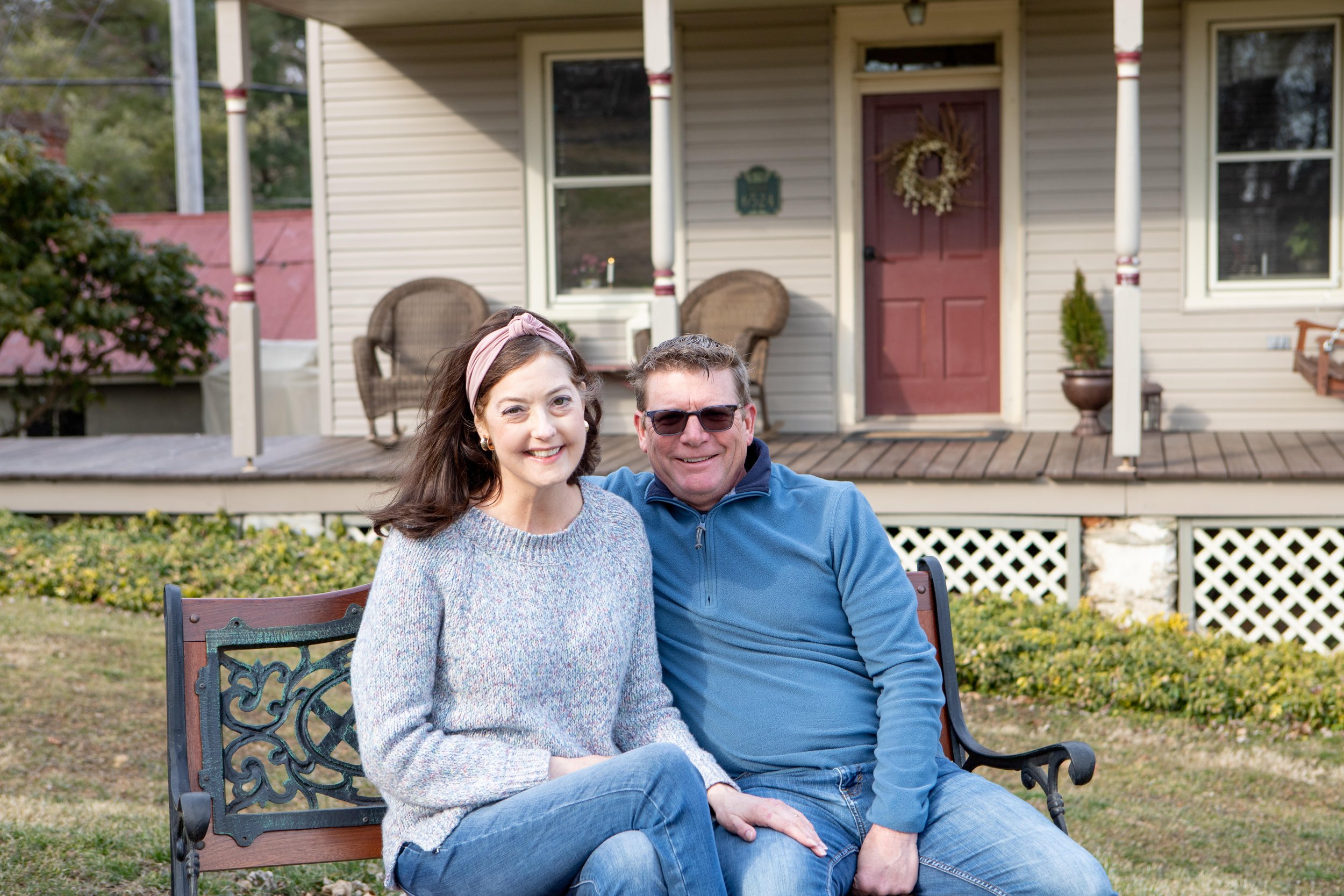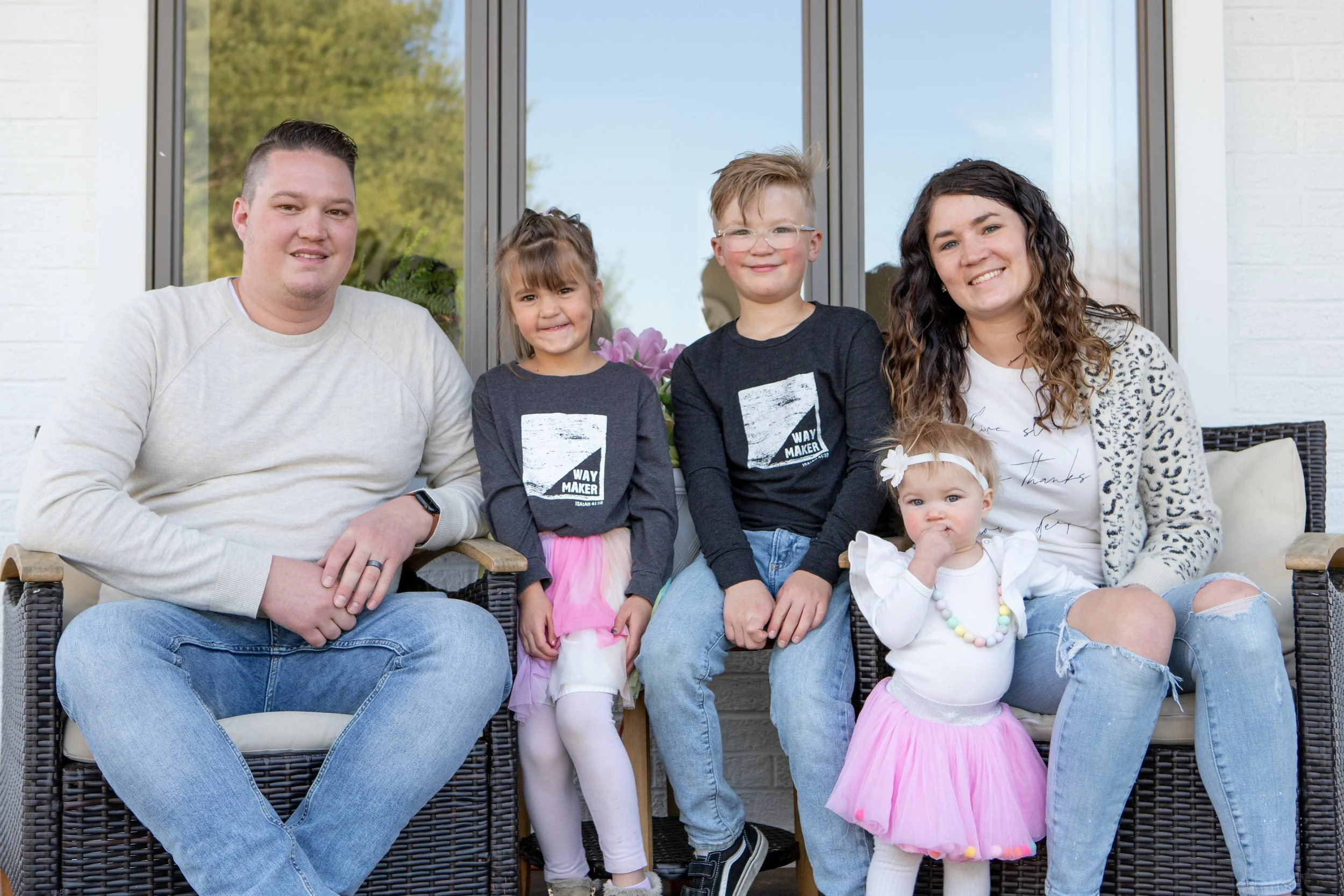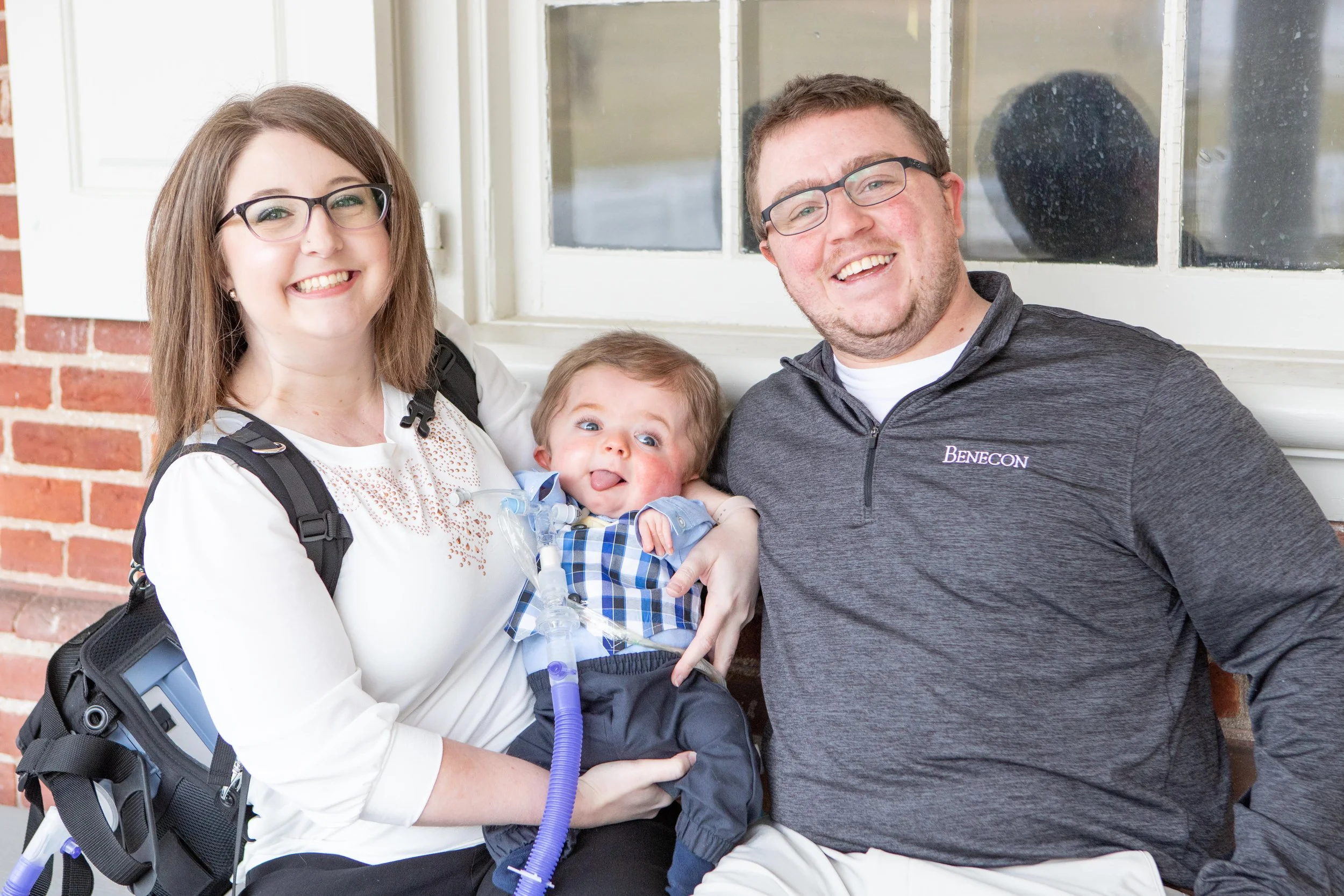2022 Recipients
Samuel I. Minder III
Affectionately known as Sammy by friends and family, this once-avid athlete played collegiate baseball, as well as a multitude of recreational and high school sports. If it involved sports, Sammy lived for it.
Sammy began experiencing exhaustion and muscular spasms in early 2016. Given the fact that his work was extremely physical in nature and was becoming more difficult by the day, he immediately became concerned. Thus began a long process of testing and visits with specialists. Eventually he was referred to Penn State Hershey’s ALS Clinic, where he was formally diagnosed with amyotrophic lateral sclerosis, which is more commonly known as ALS or Lou Gehrig’s disease. Sammy was only 33 years old. The diagnosis was unexpected and shocking given its typical 3-5-year life expectancy after diagnosis. Unfortunately, that same year Sammy and his wife were diagnosed with infertility and had begun the challenging process of fertility treatments requiring in vitro fertilization (or IVF).
These simultaneous diagnoses created an unimaginable burden: Sammy was unable to work in the field he had spent his entire career, while the ongoing fertility treatments caused financial strain.
Thankfully, the progression of Sammy’s ALS has been slower than initially expected, and while the challenges of his disease are many, including an upcoming back surgery, he is still able to function on his own. Other good news: In 2018, the Minders welcomed their first miracle baby conceived through IVF, a daughter named Josie Faith. In early 2022, they welcomed another child, completing their family. Despite the changes brought on by this devastating disease – and with its future rate of progression unclear – Sammy is thankful for each day that is granted him and is committed to living a life of gratitude for his many blessings, especially his children.
Michael Welsh
Michael was diagnosed with Crohn's disease in 2008. He was 4 years old. Because his local pediatric gastroenterologist could not get Michael's Crohn's under control, he was referred to Children's Hospital of Philadelphia (CHOP).
Michael's GI doctor at CHOP was not convinced it was Crohn's disease and started genetic testing. The only medication that would help Michael with his flares of Crohn's was prednisone. While it helped Michael, the side effects were not good for someone of such a young age.
The doctor suggested Michael undergo an ostomy and he underwent that surgical procedure in March 2014. Following surgery, something wasn't right. He would stare into space (or his eyes would look in all directions) and he would not get out of bed. He was rushed to the Pediatrics ICU. They ran test after test but couldn't determine what was wrong. When Michael stopped talking, walking and eating, stiff-person syndrome was proposed. Finally, after two weeks we had a diagnosis -- encephalitis. They immediately put in a central line and started a procedure called pheresis, through which blood is collected and platelets or white blood cells are taken out and the blood is then returned to the patient’s system. Michael finally started to feel better. He was in the hospital for seven weeks.
In November 2016, genetic testing revealed that Michael had a rare gene deficiency. He was missing the ITK gene, which is important to the immune system. This is a very rare occurrence; CHOP was aware of only six other people who were lacking the gene and they became deathly sick following a bout of mononucleosis. This missing gene is what caused Michael’s Crohn's and encephalitis. He would be the first patient to have had the "gut" complication. His only option was a bone-marrow transplant.
On August 25, 2017, Michael underwent the procedure. The marrow was flown in from a donor in Germany. Everything went great; it grafted perfectly. Currently he is 100% donor. Later that year, however, Michael broke out in a rash, which was diagnosed as graft vs. host disease. A complication from the bone-marrow transplant left him covered in a red rash over most of his body. It also affected his "gut" and lungs. During his hospital stay, he went into septic shock and ended up in the Pediatric ICU once again. The graft vs. host episode lasted six months.
In 2019 he developed cellulitis at his ostomy site, which tunneled and caused a huge hole on his right side. This time he was in the hospital for five months. That was the only time Michael appeared to be giving up. His mother, Heather, would stay with him the first half of the week, while his father, Brian, would stay the second half of the week.
Later that year, Michael developed breathing issues and ended back at CHOP. Because his immune system was compromised, he had developed nodules in his airway, which was caused by a common bacterium. He was on antibodies for a year and a half.
During the summer of 2020, Michael began complaining that his legs were hurting. X-rays confirmed he had avascular necrosis (AVN) in his hip bones. This was caused by all the steroids he had been taking throughout his life. The only option would be hip- replacement surgery.
In July 2021, Michael had his ostomy reversed and is doing well. However, because he went into septic shock and due to the treatments he received for the transplant, his kidneys were affected. Following the ostomy reversal, his kidneys shut down, which prompted a need for Michael to undergo dialysis three time a week. After his hips are replaced – the first surgery took place on March 16 and the other will hopefully take place this summer – Michael will undergo a kidney transplant. He is currently on the CHOP kidney-transplant list.
Sadly, in August 2021, Michael lost his father, Brian, to Stage 4 lung cancer. Brian always admired Michael’s positive attitude and declared he was his hero.
Maya Coon
In 2021, Maya began experiencing severe nausea each morning before school. On April 13 – following several days of staying home and visiting her primary physician -- she again indicated that she couldn’t get up for school. Her mother then took her to the emergency department at Lancaster General Hospital.
Fortunately, the wait wasn’t long and after quickly relaying to the nurses and doctors what had been taking place, various samples were taken and testing began. Within a couple of hours, the doctors reported back to Maya and her mother that while the chances were slim, it looked very much like she could have leukemia. The doctors further explained that at the very least, she would need a blood transfusion due to the low level of both white and red blood cells found in her samples.
As Lancaster General’s labs did not have the technology that was needed to properly analyze Maya’s blood, she would need to be immediately transferred to another hospital. Later that day, Maya was transferred to Nemours/Alfred I. duPont Hospital for Children, where she was required to give all new samples and undergo additional testing. After two days of waiting, the doctors confirmed that Maya had Acute Myeloid Leukemia. She would need to begin treatment immediately.
Maya’s chemotherapy treatments ranged anywhere from five to 10 days each, with two rounds each day. The side effects were particularly hard on her and she rapidly lost weight. She also lost her hair and her spirit. The doctors worked with her daily to keep the nausea and pain at bay, but things were tough.
During her fourth chemo treatment, Maya developed Appendicitis, causing intense pain and discomfort. She needed a very heavy pain regimen and with no immune system, her family was very concerned about what this would do to her recovery. Fortunately, Maya was able to rally from this setback and after a week-and-a-half at home, and the removal of her appendix, she was able to return for her final treatment.
During the final treatment, Maya began to develop breathing issues and was transferred to the Pediatric ICU. While there, they discovered that her heart and lungs were no longer functioning properly; in addition, her liver was abnormally large. Maya’s parents were told that she had become septic and that they needed to begin discussing her quality of life.
In addition to the physical ailments, Maya also began to see things that no one else could see, which led to panic attacks and more medication to sedate her. After a call to pastoral care, prayers and vigils from friends, as well as a great deal of faith, Maya once again showed her resilience and bounced back in record time.
Maya’s journey wasn’t one that she took alone. This diagnosis had a profound effect on her brother, sisters, mother, father and all her extended family. Although we continue to experience setbacks and struggles, Maya’s overall health is good, and she continues to pursue a normal, healthy teenage life.
Molly Miller
Just before midnight on August 24, 2021, a doctor walked into Molly’s room at Lancaster General Hospital and told her and her husband, Artie, that a mass was discovered growing in her brain. They prayed to God that He would help them at every turn and small detail.
Molly’s hospital stay was a result of tingling in her left hand and a drooping lip. She also had been having trouble typing at work. They thought maybe she had experienced a mild stroke or a pinched nerve. Prior to the diagnosis, their life had been fairly routine and centered on working in the yard, hanging out with family and prepping for future camping trips and great adventures.
Artie was making a career move after 27 years with the same company; a friend offered him a position with his masonry and excavation business. One week and two days after Artie started his new job, the Miller family found themselves heading to Philadelphia for Molly’s emergency surgery and recovery. They remember experiencing God at every turn and in every detail: A team of family, church friends and strangers showed up to pray and do what was needed so that the family could stay close to the hospital.
The day Molly was transported to a recovery facility in Lancaster, Pennsylvania was hit by a major hurricane; they arrived at the facility a few minutes after it started to rain (God’s details). The recovery facility provided Molly with great care, and she continued improve each day. Because of Covid, Molly’s extended family had to visit her by sitting in lawn chairs outside her window.
Molly spent a month relaxing and resting before starting chemotherapy and radiation treatment. Doctors encouraged the family – Molly included – to carry on with their vacation to the Outer Banks, during which they planned to celebrate Molly and Artie’s 30th wedding anniversary. Their daughters, Katie Ritchey and her husband Cody, and Hannah Miller and her boyfriend, Eric, made the trip, as did Molly’s sisters and their husbands.
Because Molly’s glioblastoma would need special radiation treatment due to its location in her brain, Philly was her only option. So, Molly moved into an apartment a few blocks away from the University of Pennsylvania. The treatment would be carried out over a six-week period. Molly was never alone: A family member or friend was with her every day. God was also in the details the entire time.
Molly has been in the clinical trial phase of treatment and travels to Philly once a month for tests and consultations with all her doctors and specialists. She stays upbeat and resolute in her faith in God, saying, “We pray for good news and when it’s not-so-good news, we praise Him in this storm.”
Brock Haller
In late September of 2021, 28-year-old Brock Haller was diagnosed with a rare and aggressive brain tumor called a craniopharyngioma. The tumor was located above his pituitary gland. During surgery, it was obvious the gland (and many surrounding areas) was severely impacted. The tumor was much larger and more serious than anticipated. As a result, Brock is now suffering from a magnitude of life-threatening side effects, including short-term memory loss, diabetes insipidus, disorientation, hypothalamic obesity and many more.
Brock is unable to retain any new memory for longer than eight minutes, which causes significant issues in his daily life. He is unable to work, drive or help his wife care for their three young children.
Because Brock’s case has been labeled a medical mystery, he is undergoing experimental treatment in California. The goal of this treatment is to target certain areas of the brain using electromagnetic waves. This rehabilitation will hopefully help Brock’s brain to stop misfiring.
Brock’s family is desperate for answers and prayerfully hopes for healing. They are humbled and extremely grateful for the opportunity to be sponsored by this foundation.
Greyson Walls
Grayson was born May 27, 2020; he was seven weeks premature. He was born with a rare form of skeletal dysplasia called osteogenesis imperfect (OI or Brittle Bone disease). Due to Greyson’s OI and prematurity, he was immediately intubated, assessed for fractures, and put on pain medication. It was determined that Greyson would need to be transferred to Nemours/Alfred I. duPont Hospital for Children in Wilmington, Delaware, where he would be cared for by one of the top OI teams in the country. Greyson remained in the NICU at Nemours for about 4-1/2 months. During this stay, he had many setbacks. However, with every setback Greyson showed the world how resilient he is. Finally, on September 17, 2020, Greyson was discharged. He was sent home on CPAP and required oxygen.
After only being home for 10 days, Greyson went into respiratory distress. The Penn State Health emergency department was able to stabilize Greyson and within hours, he was life-lined back to Nemours, where it was found that Greyson had a catastrophic amount of rib fracturs from the life-sustaining measures that had been taken.
In addition to the rib fracturs, he was diagnosed with tracheomalacia (floppy airway). Greyson ultimately had to be intubated to allow his fractures to heal. The determined Greyson continued to fight every step of the away. However, as each day passed and in need of additional support, the decision was made for Greyson to have a trach placed.
This is where Greyson’s real story begins. After having his trach placed, Greyson was a whole new baby. For the first time in his short life, he looked comfortable and most importantly, happy. Greyson has been home permanently since February of 2021. He is thriving at home with his parents, Scott and Candace Walls, and German Shepard, Brodie. Greyson enjoys dancing to music and playing with his toys. His favorite movies are Moana, Coco and Encanto, along with other Disney classics. He is learning to be more mobile by scooting his little body back and forth. He loves to hear himself make noises past his trach and has used that as a method to communicate in his own way. As Greyson continues his speech, occupational and physical therapies, he is learning that the sky is the limit!


